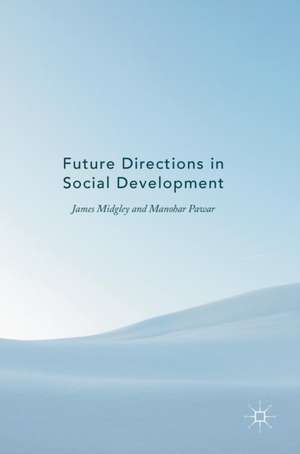Future Directions in Social Development
Editat de James Midgley, Manohar Pawaren Limba Engleză Hardback – 28 noi 2016
Preț: 946.10 lei
Preț vechi: 1153.78 lei
-18% Nou
Puncte Express: 1419
Preț estimativ în valută:
181.04€ • 189.89$ • 150.71£
181.04€ • 189.89$ • 150.71£
Carte tipărită la comandă
Livrare economică 01-15 aprilie
Preluare comenzi: 021 569.72.76
Specificații
ISBN-13: 9781137445971
ISBN-10: 1137445971
Pagini: 216
Ilustrații: XV, 281 p.
Dimensiuni: 148 x 210 x 22 mm
Greutate: 0.46 kg
Ediția:1st ed. 2017
Editura: Palgrave Macmillan US
Colecția Palgrave Macmillan
Locul publicării:New York, United States
ISBN-10: 1137445971
Pagini: 216
Ilustrații: XV, 281 p.
Dimensiuni: 148 x 210 x 22 mm
Greutate: 0.46 kg
Ediția:1st ed. 2017
Editura: Palgrave Macmillan US
Colecția Palgrave Macmillan
Locul publicării:New York, United States
Cuprins
1. Social development forging ahead .- 2. Social development in historical context .- 3. Social development: progress so far .- 4. Human rights based and good governance approaches to social development .- 5. The need for enhanced community participation .- 6. Conflict, peace and social development .- 7. Gender equality and social development .- 8. Social Development, the Environment and the Future of the Planet .- 9. Global ageing, social development and the well being of the world's elders .- 10. Religion, the spiritual dimension and social development .- 11. Social protection and social development .- 12. Enhancing global cooperation in social development .- 13. Beyond goals and targets: future of social development.
Notă biografică
James Midgley is Harry and Riva Specht Professor of Public Social Services and former Dean of the School of Social Welfare, University of California, Berkeley, US. He previously taught at the University of Cape Town, South Africa, the London School of Economics, UK, and Louisiana State University, US. His most prominent publications include Professional Imperialism: Social Work in the Third World (1981), Comparative Social Policy and the Third World (with Stewart MacPherson, 1987), Social Development: The Developmental Perspective in Social Welfare (1995), Social Policy for Development (with Anthony Hall, 2004), Social Development: Theory and Practice (2014) and Social Welfare for a Global Era: International Perspectives on Policy and Practice (2016).
Manohar Pawar is Professor of Social Work at the School of Humanities and Social Sciences and the Institute for Land, Water and Society, Charles Sturt University, Australia, and President of the International Consortium for Social Development. His most recent publications include Reflective Social Work Practice: Thinking, Doing and Being (with Bill Anscombe, 2015), Water and Social Policy (2014), Social and Community Development Practice (2014), International Social Work: Issues, Strategies and Programs (with David Cox, 2013), Sage Handbook of International Social Work (CoEd., 2012), Social Development: Critical Themes and Perspectives (with David Cox, Ed., 2010), and Community Development in Asia and the Pacific (2010).
Manohar Pawar is Professor of Social Work at the School of Humanities and Social Sciences and the Institute for Land, Water and Society, Charles Sturt University, Australia, and President of the International Consortium for Social Development. His most recent publications include Reflective Social Work Practice: Thinking, Doing and Being (with Bill Anscombe, 2015), Water and Social Policy (2014), Social and Community Development Practice (2014), International Social Work: Issues, Strategies and Programs (with David Cox, 2013), Sage Handbook of International Social Work (CoEd., 2012), Social Development: Critical Themes and Perspectives (with David Cox, Ed., 2010), and Community Development in Asia and the Pacific (2010).
Textul de pe ultima copertă
This book invites readers to think about future directions in social development. The book succinctly presents the historical context and progress of social development. By reflecting on the Millennium and Sustainable Development Goals, it discusses the increasing global relevance of several critical themes and issues such as human rights and good governance, participation, peace, gender, environment, religion and spirituality, aging, social protection and partnership. It appreciates the importance of goals and targets, but calls to look beyond them to visualise future directions in social development. The book argues that values-driven social development need to focus on knowledge creation, dissemination and training, draw on multidisciplinary knowledge and professionals, promote conscientious consumption, creating less unequal societies and engage in innovation that brings happiness to everyone.
Caracteristici
Outlines the history and current state of social development, as well as exploring future issues Enriches our understanding of social development by examining it in the context of conflict, gender equality, the environment, global ageing and religion Reviews community participation and global cooperation in social development, and provides suggestions for broadening the scope of social development














